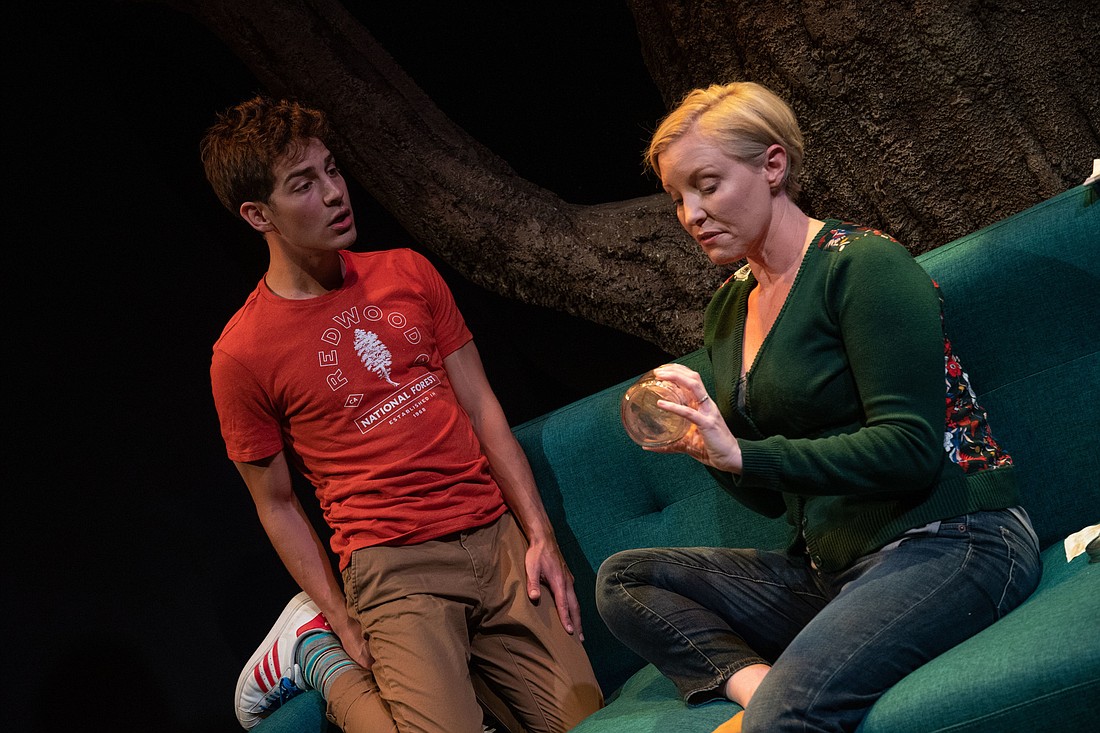- April 19, 2024
-
-
Loading

Loading

According to the National Center for Missing and Exploited Children, approximately 800,000 children vanish across America every year. That breaks down to 2,000 missing children per day. It’s every parent’s worst nightmare. Lauren Yee’s “In a Word” takes you into the nightmare at Urbanite Theatre.
Her play tells the story of Fiona (Summer Dawn Wallace) and Guy Hamlin (Terrell Wheeler), an unhappily married couple. It opens on Fiona’s birthday. Guy tries to take her out to dinner, but she doesn’t feel like celebrating. Cruelly, Fiona’s birthday falls on the two-year anniversary of their son’s abduction. The couple’s lives have been on hold ever since. It’s a living purgatory. Guy wants to get over it. Fiona prefers to stay in purgatory.
The playwright feels both parents’ pain. But Fiona is her focus, and her pain cracks the limits of speech. She’s stunned, numb, dazed, confused and tongue-tied. Yee evokes Fiona’s disassociation with fractured, poetic language. In the middle of a normal conversation, Fiona will get lost in a maze of word-associations. A “leave” of absence becomes a “leaf” of absence, and then a “tree” of absence. “Cantaloupe” becomes “can’t escape.” Fiona doesn’t trust words — or people. Everyone’s a suspect, including the woman in the mirror. Fiona keeps replaying the horrible day and blaming herself. Their missing son, Tristan, was a problem child, with an undefined disability. (The school system tagged him with attention deficit hyperactivity disorder, but he’s probably on the autism spectrum.) Tristan made Fiona’s life a living hell some days. At times, she wished he’d disappear. One day, she got her wish. Now, every day is a deeper circle of hell.
Wallace plays Fiona as a lost soul. She makes your heart go out to her character in a nuanced, internalized performance. In the world of the play, Fiona’s not looking for sympathy. She puts herself on trial — and delivers a verdict of guilty. Wheeler’s Guy is a normal guy. He makes you relate to the character’s hunger for a normal life — and to his failed attempts to reach out to Fiona. Trevor Bates, in a shape-shifting performance, stands in as the couple’s missing child, a half-hearted detective, Guy’s friends, and a few random creeps Fiona bumps into.
Erin Kraft directs with a hallucinatory pace. At times, she makes you feel like you’re underwater, gasping for air. At other times, she makes you laugh out loud.
Alison Gensmer’s costumes evoke the Hamlins’ interrupted lives and their indifference to appearances after the tragedy. (In a heartbreaking motif, a missing sweater stands in for their missing son.) Jeff Weber’s set is a collision of reality and dream. A mundane living room, apart from a massive bare tree rising up behind the couch. The counterpoint of Chris Baldwin’s lighting and Rew Tippin’s sound design smartly evokes Fiona’s dance of lucidity and confusion.
It’s a surprisingly funny play, with a mordant edge of absurdist humor. But the story at the play’s heart is no laughing matter. For a playwright, it’s a gutsy choice. And a risky one.
Child abduction is a theatrical third rail. Most playwrights avoid it, and it’s easy to see why. Aside from the occasional “Waiting for Godot,” most plays lure audiences with promises of resolution, answers and closure. Here, the lack of closure is the play’s point. Dramatically, that’s a problem.
But Yee’s knowingly painted herself in a dramatic corner. If the Hamlins can’t escape from purgatory, they’re in hell. But a forced happy ending would seem like a fraud. How does Yee end the play?
She ends it with a glimmer of hope — one that doesn’t insult the thousands of parents in hopeless situations in the real world. Decide for yourself if it’s a happy ending. But it’s an honest one.